第2章 CHAPTER I(2)
Slowly he threaded his way amongst the elegant Louis Quinze furniture, examining as though for the first time the beautiful old tapestry, the Sevres china, the Chippendale table, which was priceless, the exquisite portraits painted by Greuze, and the mysterious green twilights and grey dawns of Corot. Everywhere treasures of art, yet everywhere the restraining hand of the artist.
The faint smell of dead rose leaves hung about the room. Already one seemed conscious of a certain emptiness as though the genius of the place had gone. Mr. Sabin leaned heavily upon his stick, and his head drooped lower and lower. A soft, respectful voice came to him from the other room.
"In five minutes, sir, the carriage will be at the door. I have your coat and hat here."
Mr. Sabin looked up.
"I am quite ready, Duson!" he said.
* * * * *
The servants in the hall stood respectfully aside to let him pass.
On the way to the depot he saw nothing of those who saluted him.
In the car he sat with folded arms in the most retired seat, looking steadfastly out of the window at the dying day. There were mountains away westwards, touched with golden light; sometimes for long minutes together the train was rushing through forests whose darkness was like that of a tunnel. Mr. Sabin seemed indifferent to these changes. The coming of night did not disturb him. His brain was at work, and the things which he saw were hidden from other men.
Duson, with a murmur of apology, broke in upon his meditations.
"You will pardon me, sir, but the second dinner is now being served.
The restaurant car will be detached at the next stop."
"What of it?" Mr. Sabin asked calmly.
"I have taken the liberty of ordering dinner for you, sir. It is thirty hours since you ate anything save biscuits."
Mr. Sabin rose to his feet.
"You are quite right, Duson," he said. "I will dine."
In half-an-hour he was back again. Duson placed before him silently a box of cigarettes and matches. Mr. Sabin smoked.
Soon the lights of the great city flared in the sky, the train stopped more frequently, the express men and newspaper boys came into evidence. Mr. Sabin awoke from his long spell of thought. He bought a newspaper, and glanced through the list of steamers which had sailed during the week. When the train glided into the depot he was on his feet and ready to leave it.
"You will reserve our rooms, Duson, for one month," he said on the way to the hotel. We shall probably leave for Europe a month to-morrow."
"Very good, sir."
"You were Mrs. Peterson's servant, Duson, before you were mine!"
"Yes, sir."
"You have been with her, I believe, for many years. You are doubtless much attached to her!"
"Indeed I am, sir!"
"You may have surmised, Duson, that she has left me. I desire to ensure your absolute fidelity, so I take you into my confidence to this extent. Your mistress is in the hands of those who have some power over her. Her absence is involuntary so far as she is concerned. It has been a great blow to me. I am prepared to run all risks to discover her whereabouts. It is late in my life for adventures, but it is very certain that adventures and dangers are before us. In accompanying me you will associate yourself with many risks. Therefore - "
Duson held up his hand.
"I beg, sir," he exclaimed, "that you will not suggest for a moment my leaving your service on that account. I beg most humbly, sir, that you will not do me that injustice."
Mr. Sabin paused. His eyes, like lightning, read the other's face.
"It is settled then, Duson," he said. "Kindly pay this cabman, and follow me as quickly as possible."
Mr. Sabin passed across the marble hall, leaning heavily upon his stick. Yet for all his slow movements there was a new alertness in his eyes and bearing. He was once more taking keen note of everybody and everything about him. Only a few days ago she had been here.
He claimed his rooms at the office, and handed the keys to Duson, who by this time had rejoined him. At the moment of turning away he addressed an inquiry to the clerk behind the counter.
"Can you tell me if the Duchess of Souspennier is staying here?" he inquired.
The young man glanced up.
"Been here, I guess. Left on Tuesday."
Mr. Sabin turned away. He did not speak again until Duson and he were alone in the sitting-room. Then he drew out a five dollar bill.
"Duson," he said, "take this to the head luggage porter. Tell him to bring his departure book up here at once, and there is another waiting for him. You understand?"
"Certainly, sir!"
Mr. Sabin turned to enter his bed-chamber. His attention was attracted, however, by a letter lying flat upon the table. He took it up. It was addressed to Mr. Sabin.
"This is very clever," he mused, hesitating for a moment before opening it. "I wired for rooms only a few hours ago - and I find a letter. It is the commencement."
He tore open the envelope, and drew out a single half-sheet of note-paper. Across it was scrawled a single sentence only.
"Go back to Lenox."
There was no signature, nor any date. The only noticeable thing about this brief communication was that it was written in yellow pencil of a peculiar shade. Mr. Sabin's eyes glittered as he read.
"The yellow crayon!" he muttered.
Duson knocked softly at the door. Mr. Sabin thrust the letter and envelope into his breast coat pocket.